初中英语-一般过去时讲解课件(39张)
文档属性
| 名称 | 初中英语-一般过去时讲解课件(39张) | 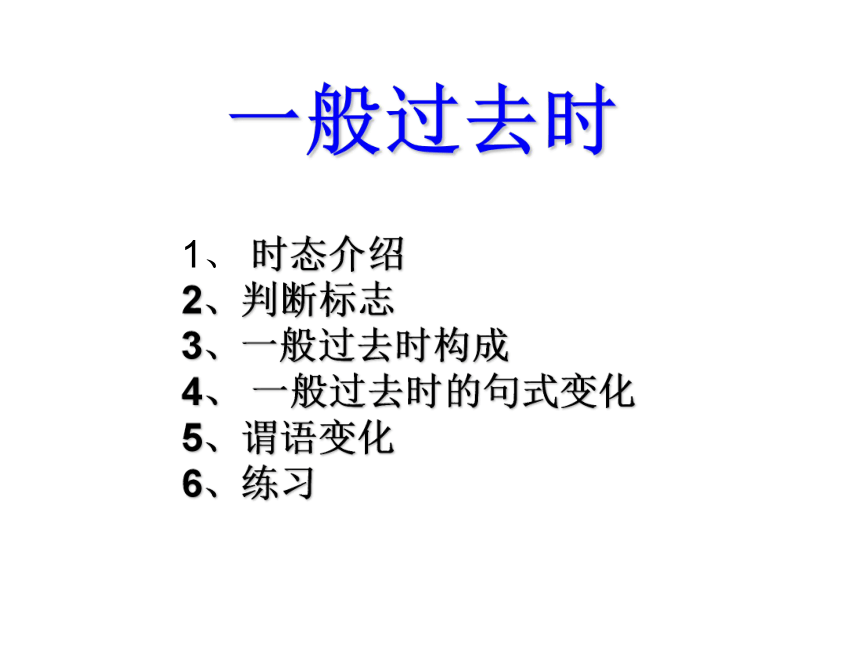 | |
| 格式 | zip | ||
| 文件大小 | 235.6KB | ||
| 资源类型 | 教案 | ||
| 版本资源 | 通用版 | ||
| 科目 | 英语 | ||
| 更新时间 | 2018-11-05 10:40:28 | ||
图片预览

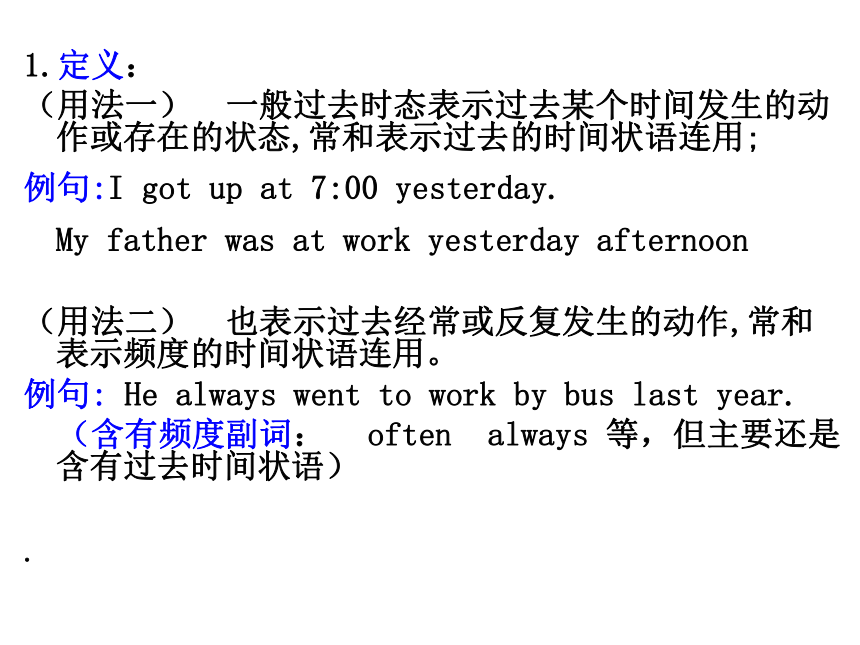
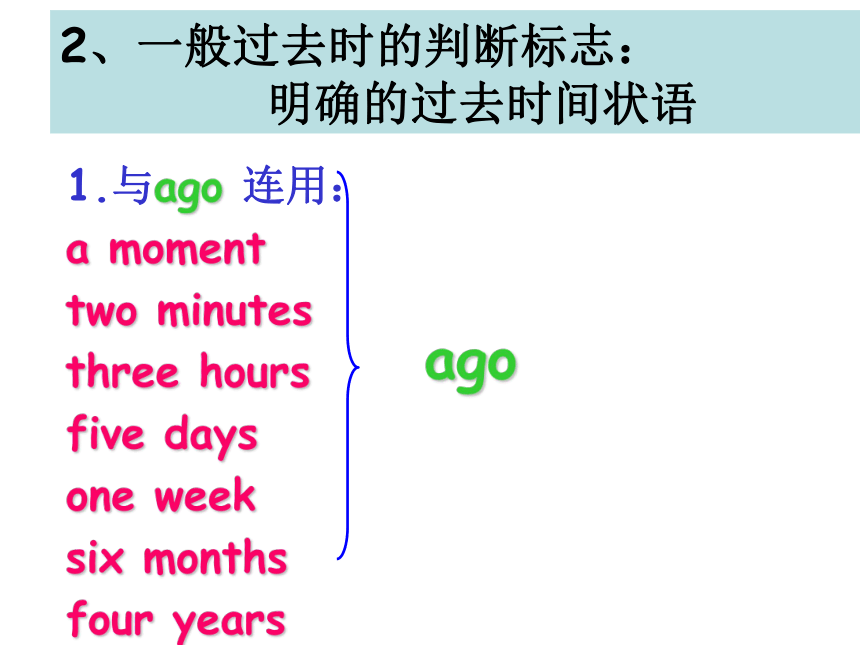
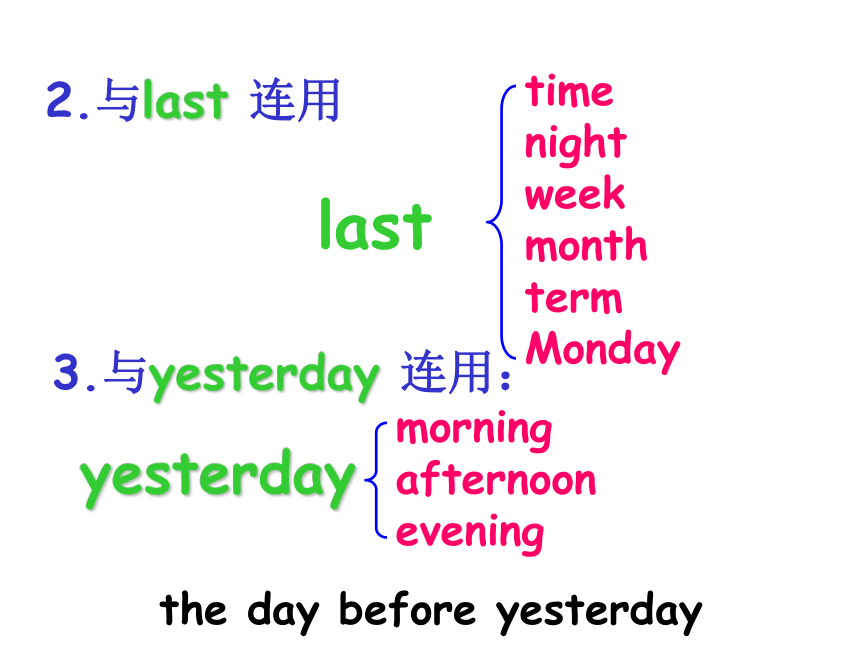
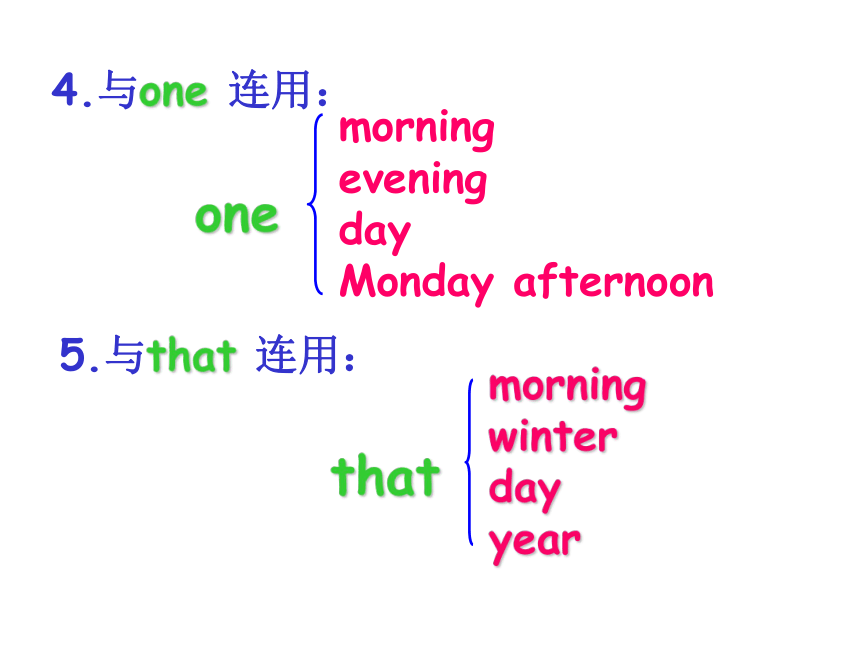
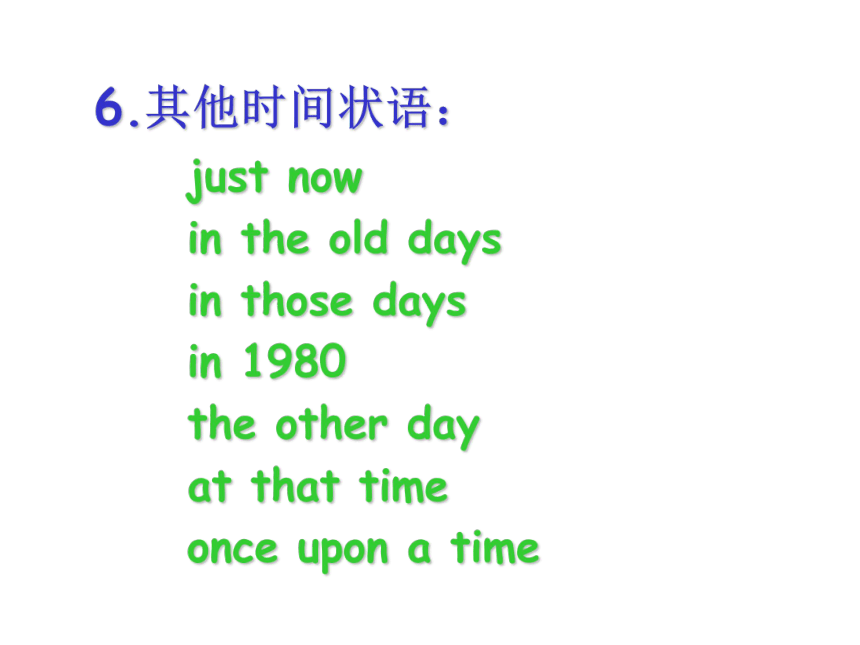
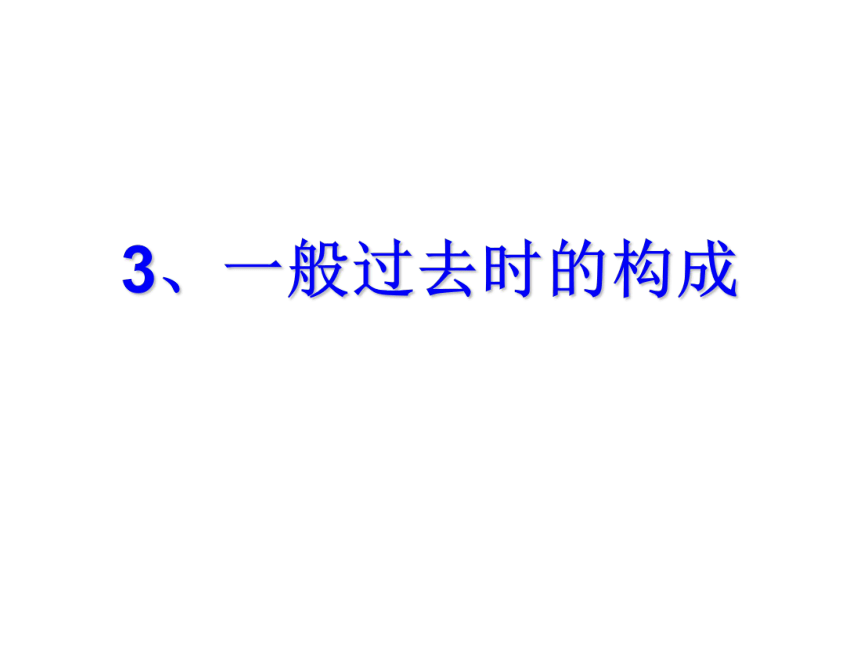
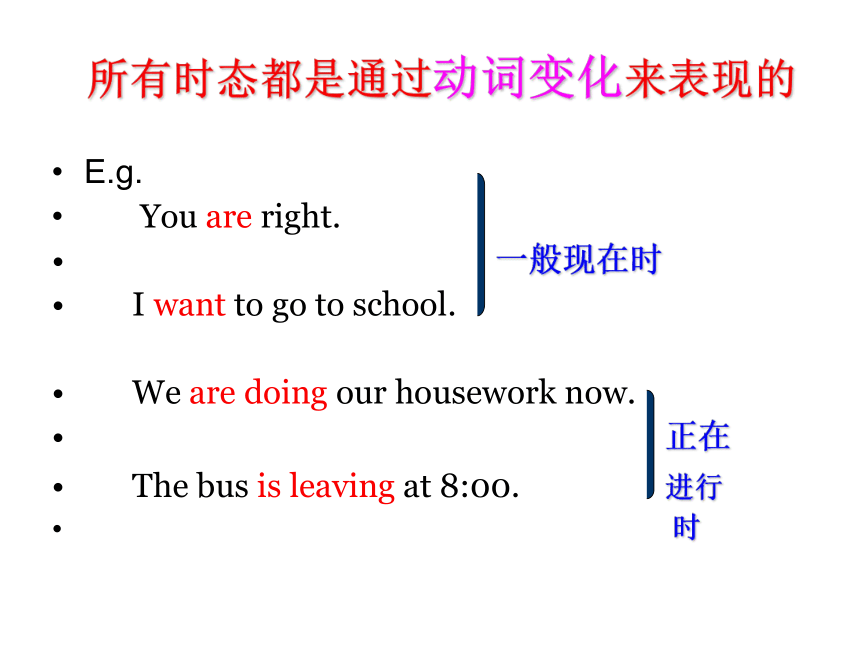
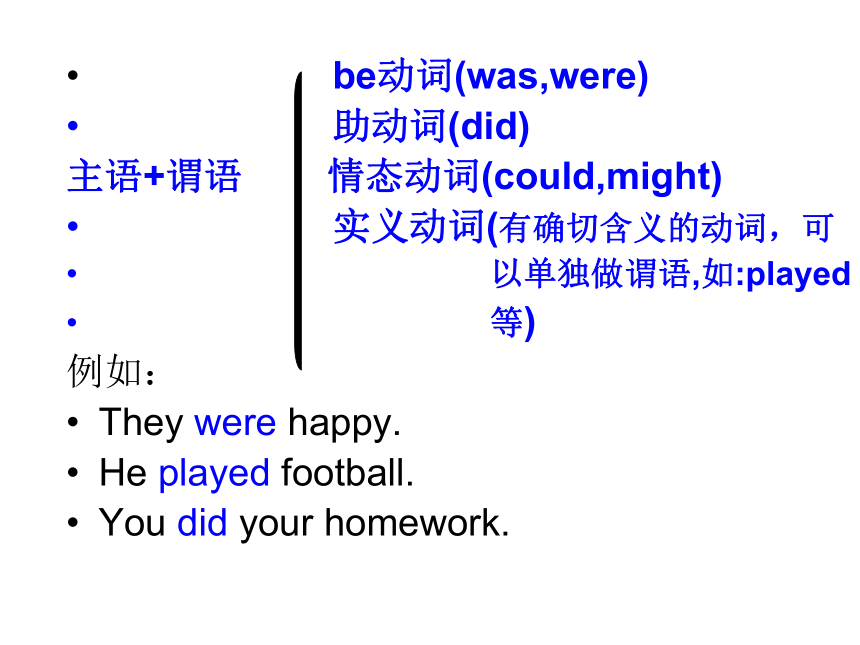
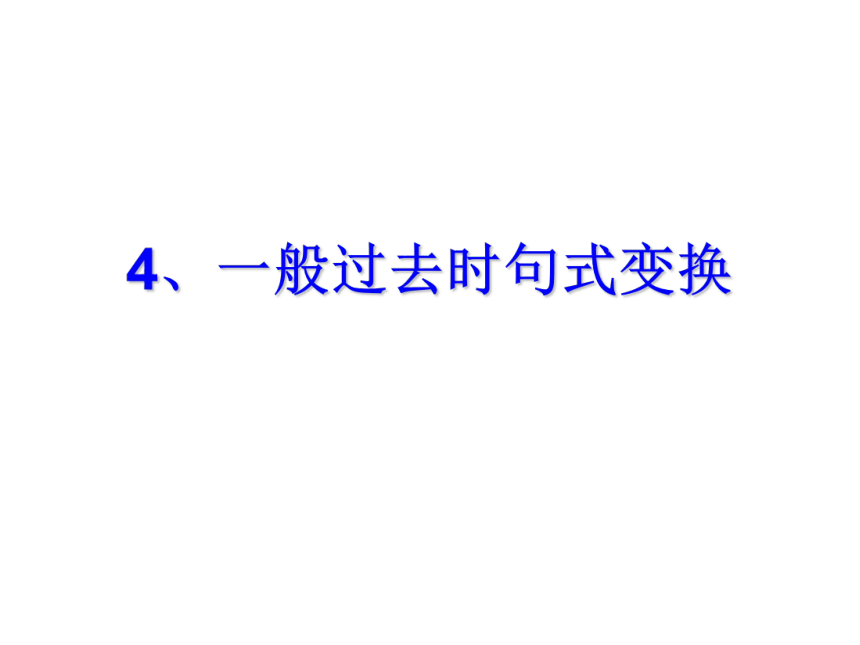

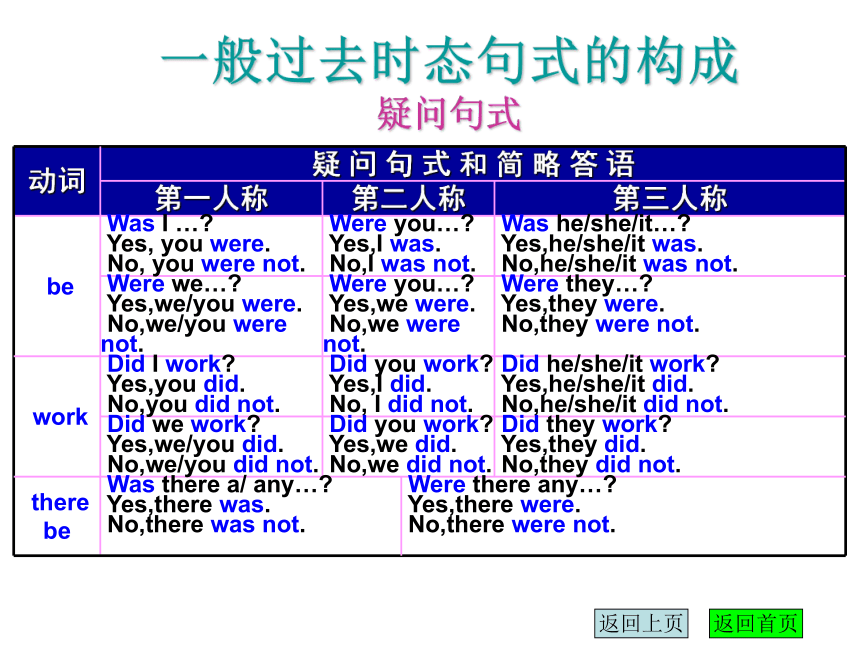
文档简介
课件39张PPT。一般过去时1、 时态介绍
2、判断标志
3、一般过去时构成
4、 一般过去时的句式变化
5、谓语变化
6、练习1.定义:
(用法一) 一般过去时态表示过去某个时间发生的动作或存在的状态,常和表示过去的时间状语连用;
例句:I got up at 7:00 yesterday.
My father was at work yesterday afternoon
(用法二) 也表示过去经常或反复发生的动作,常和表示频度的时间状语连用。
例句: He always went to work by bus last year.
(含有频度副词: often always 等,但主要还是含有过去时间状语)
.
1.与ago 连用:
a moment
two minutes
three hours
five days
one week
six months
four yearsago2、一般过去时的判断标志:
明确的过去时间状语lasttime
night
week
month
term
Mondayyesterdaymorning
afternoon
eveningthe day before yesterday 2.与last 连用3.与yesterday 连用:4.与one 连用:onemorning
evening
day
Monday afternoon5.与that 连用:thatmorning
winter
day
yearjust now
in the old days
in those days
in 1980
the other day
at that time
once upon a time6.其他时间状语:3、一般过去时的构成所有时态都是通过动词变化来表现的E.g.
You are right.
一般现在时
I want to go to school.
We are doing our housework now.
正在
The bus is leaving at 8:00. 进行
时
be动词(was,were)
助动词(did)
主语+谓语 情态动词(could,might)
实义动词(有确切含义的动词,可
以单独做谓语,如:played
等)
例如:
They were happy.
He played football.
You did your homework.
4、一般过去时句式变换一般过去时态句式的构成 陈述句式进入下页返回首页一般过去时态句式的构成 疑问句式返回上页返回首页1.肯定句:主语 + 行为动词过去式
be动词过去式(was / were)
e.g. We played football yesterday.
I was in the office last night.
He couldn’t swim 10 years ago.
2.否定句 did not / didn’t + 行为动词原形
was not / wasn’t + 其他成分
were not / weren’t + 其他成分
e.g. I was not in the office last night.
I didn't sing a song at Kangkang's party.
I didn't play video games.3. 一般疑问句
did + 主语 +行为动词原形
was / were + 主语 +其他成分
eg. - Did you go shopping yesterday?
-Yes, I did. / No, I didn’t.
-Was she 15 years old last year?
4. 特殊疑问句
特殊疑问词 +did + 主语 +行为动词原形
特殊疑问词 +was / were + 主语 +其他成分
eg. - Did you go shopping yesterday?
When and where were you born?5、谓语变化构成规则例词1. 一般在动词原形末尾加-ed look looked
play played
start started
2. 结尾是 e 的动词加 -d live lived
hope hoped
use used3. 末尾只有一个辅音字母的重读
闭音节词,先双写这个辅音字
母,再加-edstop stopped
plan planned
trip tripped4. 结尾是“辅音字母+y”的动词,
先变“y”为“i”再加-ed study studied
carry carried规则动词过去式的构成说明:
1、清念 /t/ ,即 ed 在清辅音后面念 /t/ ,
例:finished helped
passed cooked
规则动词-ed的读音元浊 /d/ ,即 ed 在元音,浊辅音后面念 /d/ ,
例:borrowed enjoyed
called moved、/t/ /d/ 之后念 /id/ , 即 ed 在 /t/ /d/ 音后面念 /id/
例:wanted shouted
needed countedgrow -- grew
know -- knew
throw -- threw
blow -- blew
write -- wrote
drive -- drove
ride -- rode
get -- got
forget -- forgot
lend -- lent
send -- sent
spend -- spent
say -- said */sed/
pay -- paid
stand -- stood
understand -- understood
let -- let put -- put
cut -- cut read -- read*am, is -- was
are -- were
do -- did
go -- went
have -- had
see -- saw
can -- could
may -- might
dig -- dug
eat -- ate
find -- found
make -- made
hear -- heard
run -- ran
take -- took
hold -- held
speak -- spoke
leave -- leftkeep -- kept
sleep -- slept
sweep -- swept
tell -- told
sell -- sold
begin -- began
sing -- sang
sit -- sat
swim -- swam
ring -- rang
give -- gave
bring -- brought
buy -- bought
think -- thought
teach -- taught
catch -- caught
come -- came
become -- became不规则动词的过去式 写出下列动词的过去式:run
borrow
grow
watch
write
smile
open
begin
swim
carry
study
finishuse
live
wake
keep
say
clean
buy
play
learn
see
read
stopgo
think
be
happen
give
become
get
rain
stay
pass
answerwent
thought
was/ were
happened
gave
became
got
rained
stayed
passed
answeredused
lived
woke
kept
said
cleaned
bought
played
learnt/ed
saw
read
stoppedran
borrowed
grew
watched
wrote
smiled
opened
began
swam
carried
studied
finished巧记动词过去时态动词一般过去时,表示过去发生事;
be用was或用were, have,has变had;
谓语动词过去式,过去时间坐标志;
一般动词加-ed,若是特殊得硬记。
否定句很简单,主语之后didn’t添;
疑问句也不难,did放在主语前;
如果谓语之前有did,谓语动词需还原;
动词若是was,were,否定就把not添。返回上页返回首页6、ExercisesIII.句型转换
They came to China in 1990.(变一般疑问句)
__________ they ________ to China in 1990?
2.I was ill for two days last week? (同上)
________ you ill for two days last week?
3. The twins go to school on foot every day. (同上)
_________ the twins _______ to school on foot every day?
4.She washed the clothes last Sunday. ( 变否定句)
She _________ ________ the clothes last SundayDidcomeWere Do godidn’twash5. She is going to go shopping tomorrow. (变否定句)
_____________________________________
6. My mother likes her students. (变一般疑问句)
_______________________________________
7. Do you watch TV on Sunday? (用last Sunday 改写成过去时态的句子)
______________________________________
8. Wei Hua bought a new pen yesterday. (变否定句)
She ________ ________ a new pen yesterday.She isn’t going to go shopping tomorrow. Does your mother like her students? Did you watch TV last Sunday? didn’t buy 用括号里动词的适当形式填空。
1. He __________ (read) that book last week.
2. Last night he ___________ (arrive) just in time for the show.
3. Mary ___________ (marry) Thomas yesterday.
4. Tom ___________ (show) us where to sit at the meeting yesterday.
5. Last summer we ___________ (visit) Uncle Jack.
6. It ___________ (rain) almost every day last month.
7. John _______ (like) to play piano when he was in secondary school.
8. Betty ___________ (work) hard all last year.
9. We ___________ (change) the color of our uniforms last Christmas.
10. Last year Frances ___________ (buy) her mother a pretty watch for her birthday.readarrivedmarriedshowedvisitedrainedlikedworkedchangedbought11. They _____________ (not watch) TV just now.
12. They _______ (carry) water for Grandpa Liu three days ago.
13. Mike and Jack _________ (make) the model plane last month.
14. _______ your friends ________ (have) a good time in the park that day?
15. My father _____ (go) to Beijing a week ago.
16. _____ Mary ______ (study) at the No. 1 Middle School the year before last?
17. His parents _________ (not go) out for a walk after supper yesterday.
18. Where _______ (be) Mei Fang last night?
didn’t watchcarriedmadeDid havewentDid studydidn’t gowas用括号内所给动词的一般过去时填空:
I _____ (have) a good day at work today. The meeting ________ (go) well this morning. Bob ___________ (not be) there. He ___________ (oversleep) because he _________ (not hear) the alarm.
Lunch _____ (be) terrible. We _____ (try) the new French restaurant in the town center. The food ______ (taste) awful. This afternoon I ________ (phone) Bill in America. He _______ (tell) me we’ve got a new contract there.
It _____ (be) an awful drive home. The traffic _____ (be) terrible.hadwentwas notoversleptdidn’t hearwastriedtastedphonedtoldwaswasI.改错题
How is Jane yesterday? _____________________
He gets to school at six yesterday. ______________
He often goes home at 6:00 last month. __________
I can fly kites seven years ago. _______________
Did you saw him just now. _______________
Tom wasn’t watch TV last night. _____________
I did my homework later . _______________
He wait for you three hours ago. ___________
Who find it just now ? _____ wasgotwentcouldseedidn’twill do(am going to do)waitedfound根据要求改写下列句子。
1. They had a meeting yesterday. (改为一般疑问句)
2. Mrs Black does some cleaning every Sunday. (改为一般疑问句)
3. I’m going to turn on the radio. (改为否定句)
4. There were no classes last Saturday afternoon. (改为反意疑问句)
5. Those students did their best. (改为否定句)
6. It was November 10th the day before yesterday.(向划线部分提问)
7. My brother went to Shanghai three days ago.(向划线部分提问)
8. They are going to visit the Summer Palace.(向划线部分提问)
Did they have a meeting yesterday?Does Mrs Black do some cleaning every Sunday?I’m not going to turn on the radio.There were no classes last Saturday afternoon, were there?Those students didn’t do their best.What was the date the day before yesterday?When did your brother go to Shanghai?What are they going to do?一般过去时态练习
用动词的过去式填空1.____ you ____(remember) to buy the oranges?
2.Who ______(invent) the computer.
3.We _____(go) to the cinema last night. The film
______(be) very good.
4.What time _____ you ______(get) to school this
morning?
5.Jim _____ (do) a lot yesterday. He ______(go)
shopping and ______ (cook) supper.返回练习订正答案用动词的过去式填空Did you remembered (remember) to buy
the oranges?
2.Who invented (invent) the computer.
3.We went (go) to the cinema last night. The
film was (be) very good.
4.What time did you got (get) to school this morning?
5.Jim did (do) a lot yesterday. He went (go) shopping and cooked (cook) supper.返回首页返回上页返回练习1. He usually gets up early in the morning.
But______________________late today.
2. She usually works from 8 a.m. to 5 p.m.
But yesterday __________________________
3. _____________________ on Sundays.
They went to the park last Monday.
4. _____________________at breakfast.
But yesterday he didn’t read the newspaper.一般过去时态练习
把下列句子改成相应时态
订正答案返回练习1. He usually gets up early in the morning.
But he got up late today.
2. She usually works from 8 a.m. to 5 p.m.
But yesterday she worked from 8 a.m. to 6 p.m.
3. They often go to the park on Sundays.
They went to the park last Monday.
4. He reads the newspaper at breakfast.
But yesterday he didn’t read the newspaper.一般过去时态练习
把下列句子改成相应时态
返回首页返回练习返回上页PRACTISE改写句子:
1、Lucy did her homework at home.(改否定句)
Lucy _______ _______ her homework at home.
2、He found some meat in the fridge.(变一般疑问句)
______ he _____ ______ meat in the fridge?
3、She stayed there for a week.(对划线部分提问)
______ ______ _____ she _____ there?
4、There was some orange in the cup.(变一般疑问句)
_____ there _____ orange in the cup? didn’t do
Did find any
How long did stay
Was anyThat’s great√4.There was some orange in the cup.(变一般疑问句)
_____ there _____ orange in the cup?
3.She stayed there for a week.(对划线部分提问)
______ ______ _____ she
_____ there?
改写句子:1.Lucy did her homework at home.(改否定句)
Lucy _______ _______ her
homework at home.2.He found some meat in the fridge.(变一般疑问句)
______ he _____ ______ meat in the fridge?
2、判断标志
3、一般过去时构成
4、 一般过去时的句式变化
5、谓语变化
6、练习1.定义:
(用法一) 一般过去时态表示过去某个时间发生的动作或存在的状态,常和表示过去的时间状语连用;
例句:I got up at 7:00 yesterday.
My father was at work yesterday afternoon
(用法二) 也表示过去经常或反复发生的动作,常和表示频度的时间状语连用。
例句: He always went to work by bus last year.
(含有频度副词: often always 等,但主要还是含有过去时间状语)
.
1.与ago 连用:
a moment
two minutes
three hours
five days
one week
six months
four yearsago2、一般过去时的判断标志:
明确的过去时间状语lasttime
night
week
month
term
Mondayyesterdaymorning
afternoon
eveningthe day before yesterday 2.与last 连用3.与yesterday 连用:4.与one 连用:onemorning
evening
day
Monday afternoon5.与that 连用:thatmorning
winter
day
yearjust now
in the old days
in those days
in 1980
the other day
at that time
once upon a time6.其他时间状语:3、一般过去时的构成所有时态都是通过动词变化来表现的E.g.
You are right.
一般现在时
I want to go to school.
We are doing our housework now.
正在
The bus is leaving at 8:00. 进行
时
be动词(was,were)
助动词(did)
主语+谓语 情态动词(could,might)
实义动词(有确切含义的动词,可
以单独做谓语,如:played
等)
例如:
They were happy.
He played football.
You did your homework.
4、一般过去时句式变换一般过去时态句式的构成 陈述句式进入下页返回首页一般过去时态句式的构成 疑问句式返回上页返回首页1.肯定句:主语 + 行为动词过去式
be动词过去式(was / were)
e.g. We played football yesterday.
I was in the office last night.
He couldn’t swim 10 years ago.
2.否定句 did not / didn’t + 行为动词原形
was not / wasn’t + 其他成分
were not / weren’t + 其他成分
e.g. I was not in the office last night.
I didn't sing a song at Kangkang's party.
I didn't play video games.3. 一般疑问句
did + 主语 +行为动词原形
was / were + 主语 +其他成分
eg. - Did you go shopping yesterday?
-Yes, I did. / No, I didn’t.
-Was she 15 years old last year?
4. 特殊疑问句
特殊疑问词 +did + 主语 +行为动词原形
特殊疑问词 +was / were + 主语 +其他成分
eg. - Did you go shopping yesterday?
When and where were you born?5、谓语变化构成规则例词1. 一般在动词原形末尾加-ed look looked
play played
start started
2. 结尾是 e 的动词加 -d live lived
hope hoped
use used3. 末尾只有一个辅音字母的重读
闭音节词,先双写这个辅音字
母,再加-edstop stopped
plan planned
trip tripped4. 结尾是“辅音字母+y”的动词,
先变“y”为“i”再加-ed study studied
carry carried规则动词过去式的构成说明:
1、清念 /t/ ,即 ed 在清辅音后面念 /t/ ,
例:finished helped
passed cooked
规则动词-ed的读音元浊 /d/ ,即 ed 在元音,浊辅音后面念 /d/ ,
例:borrowed enjoyed
called moved、/t/ /d/ 之后念 /id/ , 即 ed 在 /t/ /d/ 音后面念 /id/
例:wanted shouted
needed countedgrow -- grew
know -- knew
throw -- threw
blow -- blew
write -- wrote
drive -- drove
ride -- rode
get -- got
forget -- forgot
lend -- lent
send -- sent
spend -- spent
say -- said */sed/
pay -- paid
stand -- stood
understand -- understood
let -- let put -- put
cut -- cut read -- read*am, is -- was
are -- were
do -- did
go -- went
have -- had
see -- saw
can -- could
may -- might
dig -- dug
eat -- ate
find -- found
make -- made
hear -- heard
run -- ran
take -- took
hold -- held
speak -- spoke
leave -- leftkeep -- kept
sleep -- slept
sweep -- swept
tell -- told
sell -- sold
begin -- began
sing -- sang
sit -- sat
swim -- swam
ring -- rang
give -- gave
bring -- brought
buy -- bought
think -- thought
teach -- taught
catch -- caught
come -- came
become -- became不规则动词的过去式 写出下列动词的过去式:run
borrow
grow
watch
write
smile
open
begin
swim
carry
study
finishuse
live
wake
keep
say
clean
buy
play
learn
see
read
stopgo
think
be
happen
give
become
get
rain
stay
pass
answerwent
thought
was/ were
happened
gave
became
got
rained
stayed
passed
answeredused
lived
woke
kept
said
cleaned
bought
played
learnt/ed
saw
read
stoppedran
borrowed
grew
watched
wrote
smiled
opened
began
swam
carried
studied
finished巧记动词过去时态动词一般过去时,表示过去发生事;
be用was或用were, have,has变had;
谓语动词过去式,过去时间坐标志;
一般动词加-ed,若是特殊得硬记。
否定句很简单,主语之后didn’t添;
疑问句也不难,did放在主语前;
如果谓语之前有did,谓语动词需还原;
动词若是was,were,否定就把not添。返回上页返回首页6、ExercisesIII.句型转换
They came to China in 1990.(变一般疑问句)
__________ they ________ to China in 1990?
2.I was ill for two days last week? (同上)
________ you ill for two days last week?
3. The twins go to school on foot every day. (同上)
_________ the twins _______ to school on foot every day?
4.She washed the clothes last Sunday. ( 变否定句)
She _________ ________ the clothes last SundayDidcomeWere Do godidn’twash5. She is going to go shopping tomorrow. (变否定句)
_____________________________________
6. My mother likes her students. (变一般疑问句)
_______________________________________
7. Do you watch TV on Sunday? (用last Sunday 改写成过去时态的句子)
______________________________________
8. Wei Hua bought a new pen yesterday. (变否定句)
She ________ ________ a new pen yesterday.She isn’t going to go shopping tomorrow. Does your mother like her students? Did you watch TV last Sunday? didn’t buy 用括号里动词的适当形式填空。
1. He __________ (read) that book last week.
2. Last night he ___________ (arrive) just in time for the show.
3. Mary ___________ (marry) Thomas yesterday.
4. Tom ___________ (show) us where to sit at the meeting yesterday.
5. Last summer we ___________ (visit) Uncle Jack.
6. It ___________ (rain) almost every day last month.
7. John _______ (like) to play piano when he was in secondary school.
8. Betty ___________ (work) hard all last year.
9. We ___________ (change) the color of our uniforms last Christmas.
10. Last year Frances ___________ (buy) her mother a pretty watch for her birthday.readarrivedmarriedshowedvisitedrainedlikedworkedchangedbought11. They _____________ (not watch) TV just now.
12. They _______ (carry) water for Grandpa Liu three days ago.
13. Mike and Jack _________ (make) the model plane last month.
14. _______ your friends ________ (have) a good time in the park that day?
15. My father _____ (go) to Beijing a week ago.
16. _____ Mary ______ (study) at the No. 1 Middle School the year before last?
17. His parents _________ (not go) out for a walk after supper yesterday.
18. Where _______ (be) Mei Fang last night?
didn’t watchcarriedmadeDid havewentDid studydidn’t gowas用括号内所给动词的一般过去时填空:
I _____ (have) a good day at work today. The meeting ________ (go) well this morning. Bob ___________ (not be) there. He ___________ (oversleep) because he _________ (not hear) the alarm.
Lunch _____ (be) terrible. We _____ (try) the new French restaurant in the town center. The food ______ (taste) awful. This afternoon I ________ (phone) Bill in America. He _______ (tell) me we’ve got a new contract there.
It _____ (be) an awful drive home. The traffic _____ (be) terrible.hadwentwas notoversleptdidn’t hearwastriedtastedphonedtoldwaswasI.改错题
How is Jane yesterday? _____________________
He gets to school at six yesterday. ______________
He often goes home at 6:00 last month. __________
I can fly kites seven years ago. _______________
Did you saw him just now. _______________
Tom wasn’t watch TV last night. _____________
I did my homework later . _______________
He wait for you three hours ago. ___________
Who find it just now ? _____ wasgotwentcouldseedidn’twill do(am going to do)waitedfound根据要求改写下列句子。
1. They had a meeting yesterday. (改为一般疑问句)
2. Mrs Black does some cleaning every Sunday. (改为一般疑问句)
3. I’m going to turn on the radio. (改为否定句)
4. There were no classes last Saturday afternoon. (改为反意疑问句)
5. Those students did their best. (改为否定句)
6. It was November 10th the day before yesterday.(向划线部分提问)
7. My brother went to Shanghai three days ago.(向划线部分提问)
8. They are going to visit the Summer Palace.(向划线部分提问)
Did they have a meeting yesterday?Does Mrs Black do some cleaning every Sunday?I’m not going to turn on the radio.There were no classes last Saturday afternoon, were there?Those students didn’t do their best.What was the date the day before yesterday?When did your brother go to Shanghai?What are they going to do?一般过去时态练习
用动词的过去式填空1.____ you ____(remember) to buy the oranges?
2.Who ______(invent) the computer.
3.We _____(go) to the cinema last night. The film
______(be) very good.
4.What time _____ you ______(get) to school this
morning?
5.Jim _____ (do) a lot yesterday. He ______(go)
shopping and ______ (cook) supper.返回练习订正答案用动词的过去式填空Did you remembered (remember) to buy
the oranges?
2.Who invented (invent) the computer.
3.We went (go) to the cinema last night. The
film was (be) very good.
4.What time did you got (get) to school this morning?
5.Jim did (do) a lot yesterday. He went (go) shopping and cooked (cook) supper.返回首页返回上页返回练习1. He usually gets up early in the morning.
But______________________late today.
2. She usually works from 8 a.m. to 5 p.m.
But yesterday __________________________
3. _____________________ on Sundays.
They went to the park last Monday.
4. _____________________at breakfast.
But yesterday he didn’t read the newspaper.一般过去时态练习
把下列句子改成相应时态
订正答案返回练习1. He usually gets up early in the morning.
But he got up late today.
2. She usually works from 8 a.m. to 5 p.m.
But yesterday she worked from 8 a.m. to 6 p.m.
3. They often go to the park on Sundays.
They went to the park last Monday.
4. He reads the newspaper at breakfast.
But yesterday he didn’t read the newspaper.一般过去时态练习
把下列句子改成相应时态
返回首页返回练习返回上页PRACTISE改写句子:
1、Lucy did her homework at home.(改否定句)
Lucy _______ _______ her homework at home.
2、He found some meat in the fridge.(变一般疑问句)
______ he _____ ______ meat in the fridge?
3、She stayed there for a week.(对划线部分提问)
______ ______ _____ she _____ there?
4、There was some orange in the cup.(变一般疑问句)
_____ there _____ orange in the cup? didn’t do
Did find any
How long did stay
Was anyThat’s great√4.There was some orange in the cup.(变一般疑问句)
_____ there _____ orange in the cup?
3.She stayed there for a week.(对划线部分提问)
______ ______ _____ she
_____ there?
改写句子:1.Lucy did her homework at home.(改否定句)
Lucy _______ _______ her
homework at home.2.He found some meat in the fridge.(变一般疑问句)
______ he _____ ______ meat in the fridge?
同课章节目录
- 词法
- 名词
- 动词和动词短语
- 动词语态
- 动词时态
- 助动词和情态动词
- 非谓语动词
- 冠词
- 代词
- 数词和量词
- 形容词副词及其比较等级
- 介词和介词短语
- 连词和感叹词
- 构词法
- 相似、相近词比较
- 句法
- 陈述句
- 一般疑问句和否定疑问句
- 特殊疑问句及选择疑问句
- 反意疑问句
- 存在句(There be句型)
- 宾语从句
- 定语从句
- 状语从句
- 主谓一致问题
- 简单句
- 并列句
- 复合句
- 主谓一致
- 主、表语从句
- 名词性从句
- 直接引语和间接引语
- 虚拟语气
- 感叹句
- 强调句
- 倒装句
- 祈使句
- 句子的成分
- 句子的分类
- 题型专区
- 单项选择部分
- 易错题
- 完形填空
- 阅读理解
- 词汇练习
- 听说训练
- 句型转换
- 补全对话
- 短文改错
- 翻译
- 书面表达
- 任务型阅读
- 语法填空
- 其他资料
